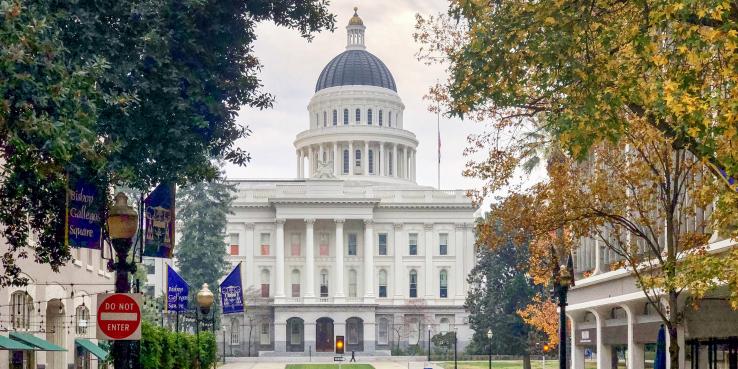SPUR is championing a budget request, three Senate bills, and six Assembly bills that would speed development of affordable housing in the Bay Area.
We are joining with other housing advocates across the state to support a $7.9 billion budget request that would provide major investments in affordable housing and funding for homelessness solutions.
With allies in the California Home Building Alliance, we are advocating for passage of two senate bills: SB 423 (Wiener), which would permanently extend a landmark law, enacted in 2017, to streamline housing approvals, and SB 4 (Wiener), which would allow affordable housing to be built by-right on the property of private colleges and religious institutions. By-right approvals allow projects that meet all current planning, zoning, and objective design and development standards to move forward without discretionary project review by various boards and commissions.
In addition to supporting the budget request and dozens of other pro-housing production bills, SPUR is sponsoring seven other bills aimed at incentivizing housing production for low- and moderate-income residents and quick-build midterm housing solutions for people experiencing homelessness.
AB 1287 (Alvarez) builds on SPUR’s work to facilitate development of housing for moderate- and middle-income residents. The bill would provide six incentives and concessions for housing projects that include moderate-income units in addition to the maximum number of lower-income, deed-restricted units currently in state density bonus law (DBL) and would allow such projects an additional 50% increase in density. The bill also extends DBL to projects in the coastal zone — projects often thwarted by discretionary approvals under local coastal programs. Co-sponsoring the bill with SPUR are Circulate San Diego and the Bay Area Council.
AB 1633 (Ting) would amend the Housing Accountability Act (HAA) to clarify that it is a violation of the act for a local jurisdiction to act in bad faith by denying or withholding an environmental clearance to which an urban infill housing development is legally entitled absent substantial evidence in the record justifying the need for additional environmental study. Currently, project applicants have no remedy under the California Environmental Quality Act when a jurisdiction abuses its discretion to delay or deny a project approval. Co-sponsoring AB 1633 with SPUR are the Bay Area Council and California YIMBY.
AB 821 (Grayson) addresses what can be years-long delays in updates of a city’s zoning code to be consistent with the land use element of its general plan — delays that can hold up proposed development and potentially expose it to litigation. AB 821 creates a specific written notification process and time limit for jurisdictions to align their zoning code with the land use element of the general plan when there is a live project application. If the time limit is exceeded, projects could proceed using the land use designation and density in the general plan. Recently enacted law allows projects that are at least two-thirds residential to proceed in this way when a city’s zoning code has yet to reflect the city’s land use element. AB 821 would allow mixed-use and other projects to also proceed in this circumstance, again subject to the land use designation and density in the general plan.
AB 894 (Friedman) builds on SPUR’s parking reform work and our Bay Area Parking Census, which revealed that the region has approximately 2.4 parking spaces for every car and approximately 1.9 parking spaces for every resident. AB 894 would require local jurisdictions to allow underutilized parking spaces to be shared with other nearby uses and to count toward parking requirements if best practices for shared parking developed by the Urban Land Institute are followed. The bill would also require that shared parking arrangements be considered when public funds are used for new development or parking lots.
AB 911 (Schiavo) clarifies that an affordable housing developer with a right-to-purchase agreement for a property may submit an AB 721 (Bloom, 2021) application to county counsel and the county recorder to modify a restrictive covenant to allow for an affordable housing development on the property. Property owners are already allowed to submit such an application.
AB 930 (Friedman) would permit two or more local governments to jointly form a Reinvestment in Infrastructure for a Sustainable and Equitable California (RISE) district to access tax increment financing from several sources, including the state, for infrastructure and equitable development in location-efficient areas. Given that the features of this new financing tool align completely with the state’s climate, housing, and economic development goals, state funding is both necessary and appropriate. Co-sponsoring the bill with SPUR are the Council of Infill Builders and CivicWell.
SB 634 (Becker) would facilitate development of “opportunity housing” communities that provide safe, secure, and high-quality midterm housing solutions for individuals experiencing homelessness. These communities would constitute what is currently a missing rung on the housing ladder: the rung between shelter housing and permanent affordable housing. SB 634 would build this rung using a model already proven in cities across the state, including San Francisco, Rohnert Park, and Santa Barbara. Co-sponsoring the bill with SPUR are DignityMoves and the Bay Area Council.
For more information on housing-related legislation sponsored by SPUR, contact Michael Lane at [email protected].
